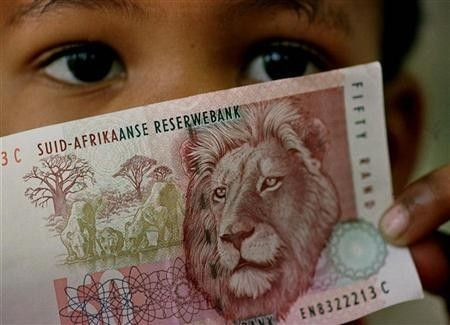S.Africa's rand struggles vs dlr, stocks edge lower

South Africa's rand softened against the dollar on Tuesday with the market showing little inclination to resist central bank moves since the start of the year to weaken the currency.
Stocks also edged lower, a day after briefly touching a record high, as investors took profits in recent gainers such as Vodacom, while Absa fell after it said it would not raise dividends soon.
Government bonds edged higher, seemingly unfazed by JSE data showing foreigners were net sellers of South African debt last week, dumping 602 million rand worth of bonds
Johannesburg's All-Share index, the broadest measure of South African stock performance, briefly hit a record high on Monday, and the benchmark Top-40 index booked its highest finish in 2-1/2 years.
After testing such levels, it was easy for investors to cash in recent gains, said Devin Shutte, a trader at Newstrading.
The market is in a bit of consolidation tone. We're seeing profit taking coming in, but no real panic, he said.
The All-share index edged down 0.1 percent to 33,060.28. The index touched a record high of 33,334.55 on Monday, topping the previous record set in May 2008.
The benchmark Top-40 index pulled back 0.15 percent after booking its highest close since May 2008.
NO RESISTANCE
The rand fell to 7.3351 against the dollar, within sight of Friday's near-6 month lows, before pulling back to 7.3010 by 1545 GMT, still weaker than Monday's close at 7.2750.
Analysts say the South African Reserve Bank (SARB) has stepped up its activity in the market to cap rand strength this year, after the currency jumped about 12 percent against the dollar in 2010.
I get the sense that the rand will continue to trade weaker for as long as the central bank keeps intervening. I don't think the market will try very hard to play the opposite direction, said Roderick Ngotho, EM forex strategist at RBS in London.
I think SARB communication could have been better before intervening so much; just 1.5 months ago the market was under the impression that the SARB was okay with a strong rand on the logic that it would help with inflation.
Bond yields, however, were lower, with the benchmark 2015 issue shedding 2.5 basis points to 7.81 percent while the yield on the 2026 note fell four basis points to 8.655 percent. Prices rise as yields fall.
On the bourse Vodacom, the South African unit of Britain's Vodafone, gave up 2.3 percent to 74.02 rand. As of Monday's close, shares of the mobile operator have gained more than 8 percent this month.
Absa Group, South Africa's top retail bank and a unit of Britain's Barclays, fell 0.2 percent to 131 rand.
Shares of the bank, which started the day in positive territory, turned negative after Chief Executive Maria Ramos told an investor conference it would not be raising dividends any time soon.
If the outlook for (Absa's dividend) is looking worse for that, I think shareholders are going to be quite nervous, said Newstrading's Shutte.
Absa slightly beat market expectations with a slight upturn in full-year earnings on Tuesday, helped by a recovery in bad debts.
© Copyright Thomson Reuters {{Year}}. All rights reserved.





















